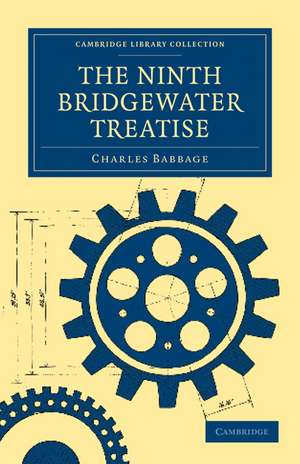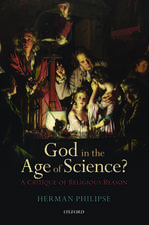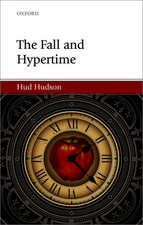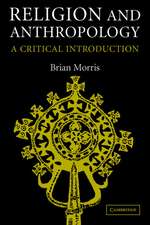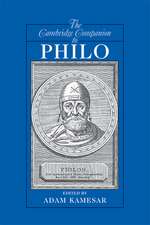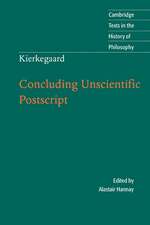The Ninth Bridgewater Treatise: Cambridge Library Collection - Science and Religion
Autor Charles Babbageen Limba Engleză Paperback – 19 iul 2009
Din seria Cambridge Library Collection - Science and Religion
- 19%
 Preț: 456.07 lei
Preț: 456.07 lei -
 Preț: 279.20 lei
Preț: 279.20 lei -
 Preț: 428.43 lei
Preț: 428.43 lei -
 Preț: 279.95 lei
Preț: 279.95 lei -
 Preț: 366.74 lei
Preț: 366.74 lei -
 Preț: 238.94 lei
Preț: 238.94 lei -
 Preț: 375.87 lei
Preț: 375.87 lei -
 Preț: 314.39 lei
Preț: 314.39 lei -
 Preț: 277.67 lei
Preț: 277.67 lei -
 Preț: 371.20 lei
Preț: 371.20 lei -
 Preț: 279.79 lei
Preț: 279.79 lei -
 Preț: 356.96 lei
Preț: 356.96 lei -
 Preț: 421.58 lei
Preț: 421.58 lei - 19%
 Preț: 455.13 lei
Preț: 455.13 lei -
 Preț: 281.11 lei
Preț: 281.11 lei -
 Preț: 224.91 lei
Preț: 224.91 lei - 19%
 Preț: 433.82 lei
Preț: 433.82 lei -
 Preț: 370.01 lei
Preț: 370.01 lei -
 Preț: 423.70 lei
Preț: 423.70 lei -
 Preț: 317.11 lei
Preț: 317.11 lei -
 Preț: 368.10 lei
Preț: 368.10 lei -
 Preț: 370.43 lei
Preț: 370.43 lei -
 Preț: 330.93 lei
Preț: 330.93 lei -
 Preț: 466.14 lei
Preț: 466.14 lei - 19%
 Preț: 455.13 lei
Preț: 455.13 lei - 19%
 Preț: 432.27 lei
Preț: 432.27 lei -
 Preț: 265.79 lei
Preț: 265.79 lei -
 Preț: 422.55 lei
Preț: 422.55 lei -
 Preț: 226.49 lei
Preț: 226.49 lei -
 Preț: 371.74 lei
Preț: 371.74 lei -
 Preț: 496.30 lei
Preț: 496.30 lei -
 Preț: 314.78 lei
Preț: 314.78 lei -
 Preț: 474.72 lei
Preț: 474.72 lei -
 Preț: 370.60 lei
Preț: 370.60 lei -
 Preț: 366.74 lei
Preț: 366.74 lei - 19%
 Preț: 433.51 lei
Preț: 433.51 lei -
 Preț: 421.20 lei
Preț: 421.20 lei -
 Preț: 280.94 lei
Preț: 280.94 lei -
 Preț: 245.56 lei
Preț: 245.56 lei -
 Preț: 314.39 lei
Preț: 314.39 lei -
 Preț: 372.51 lei
Preț: 372.51 lei -
 Preț: 353.51 lei
Preț: 353.51 lei -
 Preț: 406.79 lei
Preț: 406.79 lei -
 Preț: 225.13 lei
Preț: 225.13 lei -
 Preț: 333.25 lei
Preț: 333.25 lei
Preț: 279.79 lei
Nou
Puncte Express: 420
Preț estimativ în valută:
53.54€ • 57.25$ • 44.64£
53.54€ • 57.25$ • 44.64£
Carte tipărită la comandă
Livrare economică 17 aprilie-01 mai
Preluare comenzi: 021 569.72.76
Specificații
ISBN-13: 9781108000000
ISBN-10: 1108000002
Pagini: 252
Dimensiuni: 140 x 216 x 15 mm
Greutate: 0.32 kg
Editura: Cambridge University Press
Colecția Cambridge University Press
Seria Cambridge Library Collection - Science and Religion
Locul publicării:Cambridge, United Kingdom
ISBN-10: 1108000002
Pagini: 252
Dimensiuni: 140 x 216 x 15 mm
Greutate: 0.32 kg
Editura: Cambridge University Press
Colecția Cambridge University Press
Seria Cambridge Library Collection - Science and Religion
Locul publicării:Cambridge, United Kingdom
Cuprins
Preface; 1. Nature of the argument; 2 Argument in favour of design from the changing of laws in natural events; 3. Argument to show that the doctrines in the preceding chapter do not lead to fatalism; 4. On the account of the creation, in the first chapter of Genesis; 5. Further view of the same subject; 6. Of the desire of immortality; 7. On time; 8. Argument from laws intermitting; 9. On the permanent impression of our words and actions on the globe we inhabit; 10. On Hume's argument against miracles; 11. A priori argument in favour of the occurrence of miracles; 12. Thoughts on the nature of future punishments; 13. Reflections on free will; 14. Thoughts on the origins of evil; 15. Conclusion; Appendix.
Descriere
In this 1837 book, Babbage, the 'father of the computer', argues that science and religion are not diametrically opposed.
